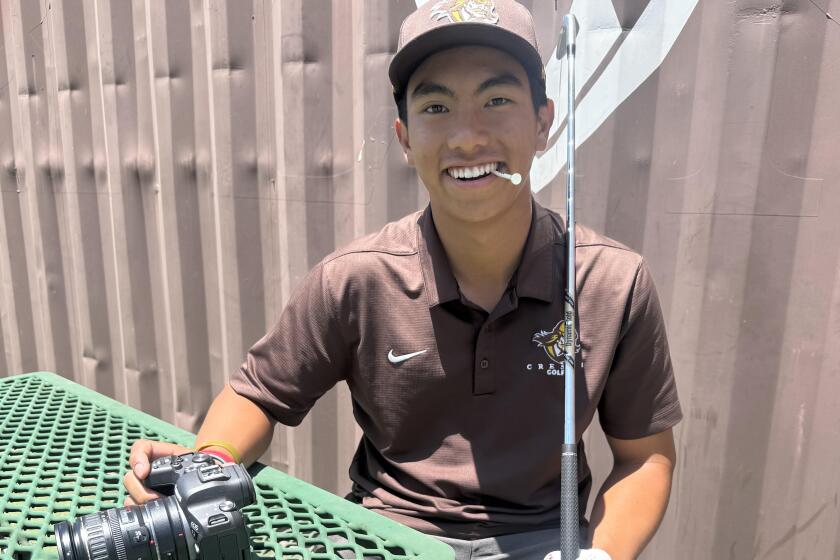Doesn’t Anybody Use Steroids?
- Share via
We’re getting all the excuses now, the culprits/victims of Major League Baseball’s new drug policy feigning/asserting their innocence/confusion, and this is the be-all program that was to be transparent.
Alex Sanchez tested positive for performance-enhancing drugs because of nutritional milkshakes.
Jorge Piedra tested positive for the same because of prescription painkillers.
Remember the good old days, when Jose Canseco admitted he took steroids, presumably because he couldn’t find anything stronger? Yet he too once hid behind some lame explanation, a position struck when the alternative meant more jail time.
See, even a guy who would command a $300,000 advance on a book about his steroid use -- the whole point of the book, if I recall -- was not beneath the contaminated urine test defense when what was at stake was a few months of freedom.
And they’ll keep coming from ballplayers who would risk a few weeks of baseball for a career of baseball. The 38 Arizona-based minor leaguers are about to be joined in their steroid-soaked suspensions by untold numbers of Florida-based minor leaguers, and pretty soon we’ll learn that the makers of resin bags have been so negligent as to allow their product to mix with the pile of Dianabol on the same conveyor belt, because, well, the accused have to come up with something.
The evidence arrives almost daily that baseball must reconsider its policy of marginally outing the violators of its joint drug-prevention program, and provide details of the substances discovered and when they were discovered. It’s tough to argue protein drinks when, say, the Nandrolone light is flashing over your urine sample twice in two weeks.
Sanchez went back to work Thursday night for Tampa Bay, and the withering assault on his character that was to be the very foundation for Major League Baseball’s new policy was delivered by Devil Ray Manager Lou Piniella: “He paid for it, and now let’s leave the kid alone.”
Who could stand up to that kind of abuse? Does the man have no compassion? Had Sanchez taken Piniella’s job 25 years ago, would Piniella “leave the kid alone”?
Baseball’s program is better but still too foggy. The NFL policy already was stronger, and last week the league toughened it again. When an Olympian is sent home, the governing body practically publishes the athlete’s molecular analysis.
To that end, player agent Scott Boras has an idea he says would eliminate confusion for ballplayers seeking legal supplements, lessen the number of false positives and perhaps end the embarrassingly bad excuses.
Boras, who received a doctorate in industrial pharmaceutics from Pacific, suggested a program by which Major League Baseball would hire an outside agency to test over-the-counter supplements. The companies that participated in and passed the evaluations would have a seal placed on their product, and players would be advised to use only the products that carried that seal.
No more milkshake positives. No more painkiller positives. No more resin positives.
“So athletes and teams can’t raise these issues. Either it’s on the list or not,” Boras said. “All these pharmaceutical companies that are giving things to athletes are out of business. It eliminates the gray area.
“The athletes will start saying, ‘Does it have the seal?’ It would bring credibility and integrity to the game and the testing process. No one can come to an athlete and say, ‘This is OK.’ This stops all that. It takes away the market.”
Barry Bonds, in theory, could have looked for the seal on his bottle of flaxseed oil.
“We’re talking about legitimacy,” Boras said. “Basically, what we need is an MLB FDA. As of today, the athletes are being forced to make decisions.”
And, well, that just isn’t going so well.
Buddy System
Mike Scioscia and Tony Pena played winter ball together in 1979, became everyday big league players within weeks of each other in 1981 and then shared a reputation as intelligent, tough catchers in careers that overlapped by 13 seasons.
Pena became manager of the Royals in 2002, the season Scioscia won a World Series with the Angels. Their relationship forged over a quarter of a century, they remain close in the way that boys do.
That is, Pena’s nickname for Scioscia is “Gordo,” Spanish for “fat.”
In kind, Pena answers to “Feo,” Spanish for “ugly.”
Puppy Love
In an organization overloaded with projects, Pena’s pet is John Buck, the 24-year-old catcher acquired last summer from the Houston Astros in the trade that sent away Carlos Beltran.
The lessons advance a tenth of a second at a time, beginning with Buck’s mechanics, specifically the footwork and release required to throw out a big league base stealer. It is a task made all the more challenging by catching a young pitching staff, many themselves learning to hold runners and hasten their delivery to Buck.
The adequate big league catcher delivers the ball -- from receipt to second base -- in 1.9 seconds. Buck arrived from Houston at 2.1 seconds, the one-fifth second lost in an exaggerated throwing motion that included a discernible hitch near the top, and providing the half-step baserunners needed.
“Maybe I got away with it all the way to last year,” Buck said. “Maybe I got exposed last year. I couldn’t get away with just having a good arm.... It was my first year and I was just trying to get through it, play every day and stay in the lineup.”
As usual, winter came early for the Royals, freeing Buck to revamp his delivery in October. By last week, clocked hundreds of times by Pena -- in spring training, in the regular season, and even between innings, when Buck throws through to second base -- Buck has been under two seconds every time.
The Royals love all that Buck is, a natural and humble leader with uncanny instincts for the game. Unlike many organizations, the Royals make their final adjustments in the major leagues, meaning Buck, instead of picking up spare innings behind Brad Ausmus with the Astros, will play every day, and everyone will live with the consequences.
Pena calls him “my young puppy.”
“What you want with a young catcher is to teach him to be a leader out there,” he said. “It is very tough to do. But his intuition is just so great. He’s not afraid to ask questions; he knows he doesn’t know everything.”
Now, instead of loopy arm action and tailing throws to second base, Buck brings the ball straight to his ear and fires from there. It took thousands of throws over a winter spent in Arizona, most of them into a net.
“I’ll tell you what,” he said, “a lot more throws than balls I hit.”
After all that, he still needs another tenth.
Buck smiled.
“I know I can get quicker,” he said.
Bats and Pieces
The Dodgers need to get over themselves and list the Angels on their scoreboards as LAA. The refusal to recognize the franchise name -- no matter how temporary -- is petty. The flag flying over Yankee Stadium -- there are 30, one for each team -- calls them the Los Angeles Angels, which ought to be good enough for the Dodgers.... Felipe Alou, on the new Dodger Stadium configuration: “Larry Walker doesn’t have to walk too far to give the ball to the fans now. He could almost do it from fair territory.” Alou was the manager and Walker his right fielder for the Montreal Expos at Dodger Stadium on April 24, 1994, when Walker, with a runner on base, caught a ball for the second out and handed it to a boy in the seats. After a few steps, he went back for the ball, and the inning resumed.
The Dodgers appear to be preparing for the post-Darren Dreifort years; he doesn’t have a locker in the Dodger Stadium clubhouse. Tim Salmon, also on the 60-day disabled list, also potentially out for the season, also in the final year of his contract and also rehabilitating injuries away from the club, maintains a prominent locker in the Angel clubhouse.... They are rich. They are famous. They are lucky. In the same week, Drew Carey caught a foul ball in Cleveland and Doug Flutie, wearing a glove, caught a foul ball in Boston. Which brings us to a point: If you’re an adult and you’re at a ballpark and you’re wearing a baseball glove, you’d better be on the 25-man roster.
More to Read
Go beyond the scoreboard
Get the latest on L.A.'s teams in the daily Sports Report newsletter.
You may occasionally receive promotional content from the Los Angeles Times.










